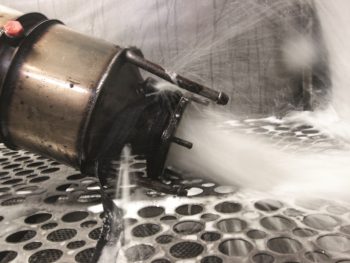Businesses running diesel vans could save major sums by having their diesel particulate filters (DPF) cleaned rather than replaced.

Ivor Searle, which runs a professional trade-only DPF cleaning service, says one of its major fleet clients has saved its own customers almost £77,000 by making use of the service to clean DPFs, rather than pay an average replacement cost of £772 per vehicle.
It’s a service that could particularly benefits delivery vans or vehicles in urban areas.
DPFs are commonly used to help vans comply with emissions regulations, by capturing soot deposits from incomplete combustion in the exhaust system.
Although DPFs are designed to effectively self-clean in a process called ‘regeneration’, this is only effective when travelling consistently at moderate to high engine speed. And if a vehicle is frequently used to travel short distances and then switch off, such as delivery vans, then it is unlikely to produce the exhaust temperature required to enable regeneration. This results in excessive soot build-up and a continual reduction in vehicle performance – with the vehicle potentially going into ‘limp’ mode.
Utilising flash cleaning technology, Ivor Searle’s DPF process removes all soot deposits, including PM10 particles, cerium oxide deposits and oil residues from the DPF.
David Eszenyi, commercial director of Ivor Searle, said: “Now more than ever, taking a preventive approach to vehicle maintenance is not only the most sustainably conscious way forward, it is also financially proven to reduce costs.
“With the fleet industry needing to retain vehicles in service for longer due to the global semi-conductor crisis affecting the supply of new vans, there is a major onus on fleet operators and maintenance companies to ensure that vehicle performance is protected as much as possible. By cleaning DPFs regularly, less energy is required to produce new ones, so this contributes positively to a circular economy.”

